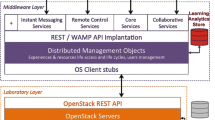Abstract
Lab-based teaching and learning is essential for STEM education as proficiency in the practice of programming is critical; be it for the development or operation of software applications or the provisioning of cloud services. This enables learners to practice conceptual understanding by applying it to solve real-world problems. In the face of rapid advancement and disruptions of technologies, computer lab curriculum needs to be agile to keep pace with ever changing education landscape. In this paper, we describe a case study on the journey taken by the STEM programme of Singapore University of Social Sciences to evolve its lab teaching via developing virtual lab infrastructure and continuously adapting it to teaching needs via the DevOps process. First, lab environments are migrated to cloud-based virtual machines, providing continuous access within or outside of the physical labs. Infrastructure-as-code and automation are applied to continuously develop and to deploy incremental adaptation through containerized apps in a unified workspace. These apps are customized to suit the specific requirements of the lab curriculum, be it for programming, analytics, database management or even cloud computing. Next, special purpose interactive lab guides are developed to provide automatic and interactive feedback to students who are engaged in the lab exercises. Finally, all online activities in the unified workspace are captured for analysis to assess the pedagogical and operational effectiveness of the unified lab workspace. As of date, the virtual lab infrastructure supports around 3500 students in 14 STEM courses annually.
Access this chapter
Tax calculation will be finalised at checkout
Purchases are for personal use only
Similar content being viewed by others
References
Martínez-Argüelles, MJ., Plana-Erta, D., Fitó-Bertran, À.: Impact of using authentic online learning environments on students’ perceived employability. Educ. Tech. Res. Dev. (2022). https://doi.org/10.1007/s11423-022-10171-3
Gamage, K.A., Perera, D.A., Wijewardena, M.A.: Mentoring and coaching as a learning technique in higher education: the impact of learning context on student engagement in online learning. Educ. Sci. (2021)
Impact of Coronavirus on Students’ Academic Progress and College Plans. https://www.niche.com/about/enrollment-insights/impact-of-coronavirus-on-students-academic-progress-and-college-plans#college
Cellini, S.R., Grueso, H.: Student learning in online college programs. AERA Open 7 (2021). https://doi.org/10.1177/23328584211008105
Guangul, F.M., Suhail, A.H., Khalit, M.I., Khidhir, B.A.: Challenges of remote assessment in higher education in the context of COVID-19: a case study of Middle East College. Educ. Assess. Eval. Account. 32(4), 519–535 (2020). https://doi.org/10.1007/s11092-020-09340-w
Mead, J., et al.: A cognitive approach to identifying measurable milestones for programming skill acquisition. ACM SIGCSE Bull. 38(4), 182–194 (2006)
Xie, B., et al.: A theory of instruction for introductory programming skills. Comput. Sci. Educ. 29(2–3), 205–253 (2019)
Rao, D.M.: Experiences with auto-grading in a systems course. In: 2019 IEEE Frontiers in Education Conference (FIE), pp. 1–8. IEEE, October 2019
Author information
Authors and Affiliations
Corresponding author
Editor information
Editors and Affiliations
Rights and permissions
Copyright information
© 2023 The Author(s), under exclusive license to Springer Nature Switzerland AG
About this paper
Cite this paper
Horng-Jyh, P.W. et al. (2023). Virtual Lab Workspace for Programming Computers – Towards Agile STEM Education. In: Uden, L., Liberona, D. (eds) Learning Technology for Education Challenges. LTEC 2023. Communications in Computer and Information Science, vol 1830. Springer, Cham. https://doi.org/10.1007/978-3-031-34754-2_5
Download citation
DOI: https://doi.org/10.1007/978-3-031-34754-2_5
Published:
Publisher Name: Springer, Cham
Print ISBN: 978-3-031-34753-5
Online ISBN: 978-3-031-34754-2
eBook Packages: Computer ScienceComputer Science (R0)




